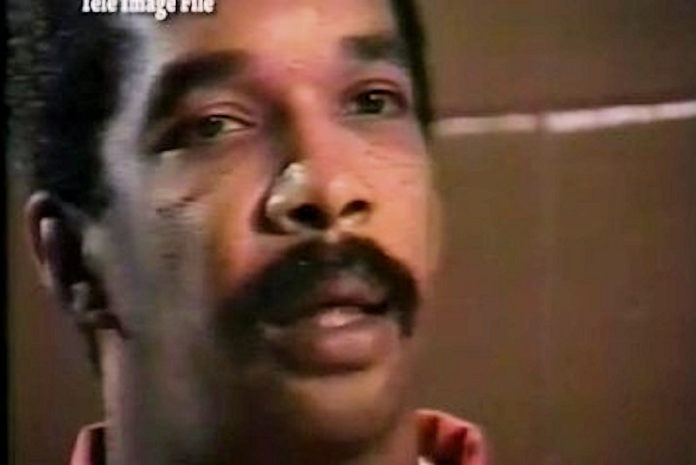
You might not be surprised that justice officials of President Jovenel Moïse’s government are trying to find a pretext to free former CIA agent and death-squad leader Emmanuel “Toto” Constant, whom U.S. immigration agents returned to Haiti on Jun. 23.
But you probably will be surprised at just how lame their current excuse is.
Yesterday, Jul. 8, the Haiti Press Network (HPN) reported that the Gonaïves prosecutor, Serard Gazius, said that he has been “unable to locate” any records of the Nov. 16, 2000 judgment rendered in Gonaïves convicting Constant in absentia for involvement in the April 1994 Raboteau massacre.
As the leader from 1991 to 1994 of the large paramilitary organization known as the Revolutionary Front for the Advancement and Progress of Haiti (FRAPH), Constant had command responsibility, the court found.
The trial was one of the most famous and historic in Haitian history, even according to the U.S. Embassy. “From April 18-22 1994, members of the Haitian military and of the paramilitary FRAPH organization conducted a series of killings, rapes, house-burnings and other acts of violence in the seaside shanty neighborhood of Raboteau in Gonaïves,” wrote U.S. Embassy Chargé d’Affaires Douglas Griffiths in a May 13, 2005 secret cable, obtained by the media organization WikiLeaks and provided to Haïti Liberté in 2011. “The violence, targeted at supporters of then-President Aristide (in exile at the time), was one of the worst atrocities of the 1991-94 coup years, and has gone down in Haitian history as the ‘Raboteau massacre’… The Raboteau trial resulted in the conviction in absentia of 37 military and paramilitary members, including [Louis-Jodel] Chamblain [FRAPH’s second in command] and Constant, and the conviction of 15 others present at the trial… The Raboteau trial and convictions were viewed by many here (and in the U.S.) as a milestone victory for justice against the repressive military regime of the early 1990s.” [our emphasis.]
Constant could not be arrested and physically present at that trial because he had fled Haiti to the U.S. in late 1994, after 20,000 U.S. troops had militarily occupied the country on Sep. 19, 1994 and returned President Jean-Bertrand Aristide to power on Oct. 15, 1994. Despite a formal extradition request from Haiti, Constant eventually received political asylum in the U.S., where he lived for 26 years, 14 of them behind bars. From 1996 to 2006, he was a real estate agent in the New York metro area, but he was arrested in 2006 and convicted of mortgage fraud and grand larceny. Sentenced in 2008, he served 12 years in New York State prisons.
Now that he is back in Haiti, Constant can request a new trial. But Mr. Gazius seems to be looking for a way to spring him from the jail in St. Marc where he is being held. Haitian police arrested Constant when he stepped off the U.S. Immigration and Customs Enforcement (ICE) charter flight.
Fifteen years ago, the de facto government of U.S.-installed Prime Minister Gérard Latortue used a kangaroo court and what the U.S. Embassy called judicial “connivance” to free FRAPH’s #2, Louis-Jodel Chamblain, from jail.
When asked by HPN if Constant might be freed, Gazius evaded the question, responding: “It is up to the Supreme Court [Court de Cassation] to put out its position in this case before I can say anything.”
In an effort to assist Commissaire Gazius in his responsibility to seek justice on behalf of the victims of the Raboteau massacre, Haïti Liberté is here making available to him and to the world a copy of the Raboteau trial judgment in French as well as a translation into English, both notarized by a U.S. Embassy Official. He is free to download the document.
Furthermore, says Mario Joseph of the Office of International Lawyers (BAI) which helped prosecute the trial, the Raboteau judgment was published in the official government journal of record, Le Moniteur.
Gazius claims he asked for a copy of the judgment from the Supreme Court but has “received no response,” reports the HPN. The prosecutor also apparently speculated that the record in the Supreme Court’s archives “was disappeared” by the Jan. 12, 2010 earthquake.
We trust this service by Haïti Liberté to the Gonaïves prosecutor’s office will advance the long neglected and encumbered pursuit of justice on behalf of the Haitian people.









